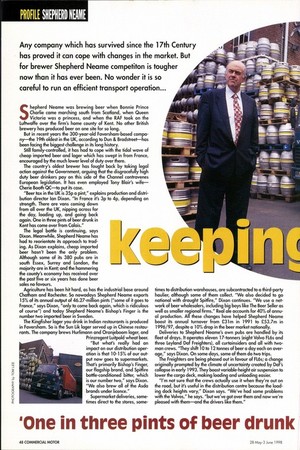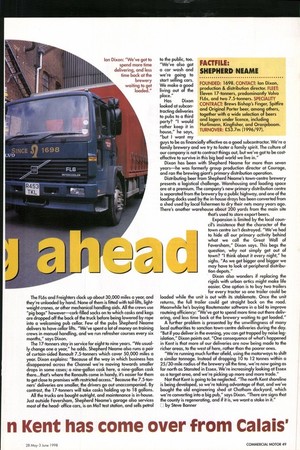Any company which has survived since the 17th Century has
Page 52

Page 53

If you've noticed an error in this article please click here to report it so we can fix it.
proved it can cope with changes in the market. But for brewer Shepherd Neame competiton is tougher now than it has ever been. No wonder it is so careful to run an efficient transport operation...
Shepherd Neame was brewing beer when Bonnie Prince Charlie came marching south from Scotland, when Queen Victoria was a princess, and when the RAF took on the Luftwaffe over the firm's home county of Kent. No other British brewery has produced beer on one site for so long.
But in recent years the 300-year-old Faversham-based company—the 19th oldest in the UK, according to Dun & Bradstreet—has been facing the biggest challenge in its long history.
Still family-controlled, it has had to cope with the tidal wave of cheap imported beer and lager which has swept in from France, encouraged by the much lower level of duty over there.
The country's oldest brewer has fought back by taking legal action against the Government, arguing that the disgracefully high duty beer drinkers pay on this side of the Channel contravenes European legislation. It has even employed Tony Blair's wife— Cherie Booth QC—to put its case.
The legal battle is continuing, says Dixon. Meanwhile, Shepherd Neame has had to reorientate its approach to trading. As Dixon explains, cheap imported beer hasn't been the only problem. Although some of its 380 pubs are in south Essex, Surrey and London, the majority are in Kent; and the hammering the county's economy has received over the past five or six years has done beer sales no favours.
Agriculture has been hit hard, as has the industrial base around Chatham and Rochester. So nowadays Shepherd Neame exports 15% of its annual output of 46.27-million pints ("some of it goes to France," says Dixon, "only to come back again, which is ridiculous of course") and today Shepherd Neame's Bishop's Finger is the number two imported beer in Sweden.
The Kingfisher lager you drink in Indian restaurants is produced in Faversham. So is the Sun Lik lager served up in Chinese restaurants. The company brews Hurlimann and Oranjeboom lager, and Prinzregent Luitpold wheat beer.
"But what's really had an impact on our distribution operation is that 10-15% of our output now goes to supermarkets. That's primarily Bishop's Finger, our flagship brand, and Spitfire bottle-conditioned bitter, which is our number two," says Dixon. "We also brew all of the Asda brands under licence."
Supermarket deliveries, sometimes direct to the stores, some times to distribution warehouses, are subcontracted to a third-party haulier, although some of them collect. "We also decided to go national with draught Spitfire," Dixon continues. "We use a network of beer wholesalers, including big boys like The Beer Seller as well as smaller regional firms." Real ale accounts for 40% of annual production. All these changes have helped Shepherd Neame boost its annual turnover from £31m in 1991 to £53.7m in 1996/97, despite a 10% drop in the beer market nationally.
Deliveries to Shepherd Neame's own pubs are handled by its fleet of drays. It operates eleven 17-tonners (eight Volvo FL6s and three Leyland Daf Freighters), all curtainsiders and all with twoman crews. "They shift 10 to 12 tonnes of beer a day each on average," says Dixon. On some days, some of them do two trips.
The Freighters are being phased out in favour of FL6s; a change originally prompted by the climate of uncertainty created by Daf's collapse in early 1993. They boast variable-height air suspension to lower the cargo deck, making loading and unloading easier. "I'm not sure that the crews actually use it when they're out on the road, but it's useful in the distribution centre because the loading dock heights vary," Dixon says. "We've had some problems with the Volvos," he says. "but we've got over them and now we're pleased with them—and the drivers like them." The F16s and Freighters clock up about 30,000 miles a year, and they're unloaded by hand. None of them is fitted with tail-lifts, lightweight cranes, or other mechanical handling aids. All the crews use "pig bags" however—cork-filled sacks on to which casks and kegs are dropped off the back of the truck before being lowered by rope into a welcoming pub cellar. Few of the pubs Shepherd Neame delivers to have cellar lifts. "We've spent a lot of money on training crews in manual handling, and we run refresher courses every six months," says Dixon. The 17-tonners stay in service for eight to nine years. "We usually change one a year," he adds. Shepherd Neame also runs a pair of curtain-sided Renault 7.5-tonners which cover 50,000 miles a year. Dixon explains: "Because of the way in which business has disappeared across the Channel we're moving towards smaller drops in some cases; a nine-gallon cask here, a nine-gallon cask there...that's where the Renaults come in handy, it's easier for them to get close to premises with restricted access." Because the 7.5-tonners' deliveries are smaller, the drivers go out unaccompanied. By contrast, the 17-tanners will take casks holding up to 18 gallons.
All the trucks are bought outright, and maintenance is in-house. Just outside Faversham, Shepherd Neame's garage also services most of the headoffice cars, is an MoT test station, and sells petrol to the public, too. "We've also got a car wash and we're going to start selling cars. We make a good living out of the place."
Dixon has been with Shepherd Neame for more than seven years—he was formerly group production director at Courage, and ran the brewing giant's primary distribution operation. Distributing beer from Shepherd Neame's town-centre brewery presents a logistical challenge. Warehousing and loading space are at a premium. The company's new primary distribution centre is separated from the brewery by a public highway, and one of the loading docks used by the in-house drays has been converted from a shed used by local fishermen to dry their nets many years ago. There's another warehouse about 200 yards from the main site that's used to store export beers. Expansion is limited by the local council's insistence that the character of the town centre isn't destroyed. "We've had to hide all our primary activity behind what we call the Great Wall of Faversham," Dixon says. This begs the question, why not simply get out of town? "I think about it every night," he sighs. "As we get bigger and bigger we may have to look at peripheral distribution depots." Dixon also wonders if replacing the rigids with urban artics might make life easier. One option is to buy two trailers for every tractor so one trailer could be loaded while the unit is out with its stablemate. Once the unit returns, the full trailer could get straight back on the road. Meanwhile he's buying Routemaster software in a bid to improve routeing efficiency: "We've got to spend more time out there delivering, and less time back at the brewery waiting to get loaded." A further problem is presented by the unwillingness of many local authorities to sanction town-centre deliveries during the day. "But if you deliver in the evening, you can get trapped by noise legislation," Dixon points out. "One consequence of what's happened in Kent is that more of our deliveries are now being made to the richer areas, to the west of here, rather than the poorer ones. "We're running much further afield, using the motorways to shift a similar tonnage. Instead of dropping 10 to 12 tonnes within a 25/30-mile radius of the brewery all the time, we're now going as far north as Stansted in Essex. We're increasingly looking at Essex as a target area, and we're picking up more and more trade." Not that Kent is going to be neglected. "The north Kent shoreline is being developed, so we're taking advantage of that, and we've bought the old engineering shed at Chatham dockyard, which we're converting into a big pub," says Dixon. "There are signs that the county is regenerating, and if it is, we want a stake in it."
by Steve Banner FACT FILE: SHEPHERD NEAME FOUNDED: 1698. CONTACT: Ian Dixon, production & distribution director. FLEET: Eleven 17-tonners, predominantly Volvo FL6s, and two 7.5-tonners. SPECIALITY CONTRACT: Brews Bishop's Finger, Spitfire and Original Porter beer, among others, together with a wide selection of beers and lagers under licence, including Hurlimann, Kingfisher, and Oranjeboom. TURNOVER: £53.7m (1996/97).






















































































































